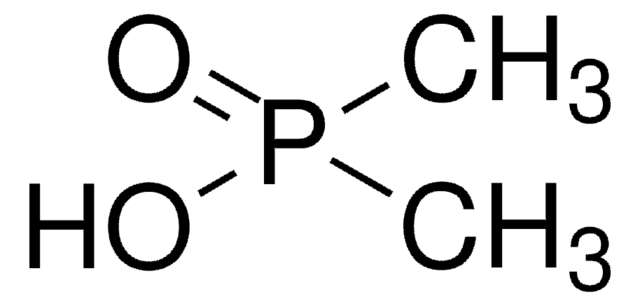68572
Dibutyl phosphate
≥97.0% (T)
Synonym(s):
Phosphoric acid dibutyl ester
About This Item
Recommended Products
Quality Level
Assay
≥97.0% (T)
form
liquid
density
1.06 g/mL at 20 °C (lit.)
SMILES string
CCCCOP(O)(=O)OCCCC
InChI
1S/C8H19O4P/c1-3-5-7-11-13(9,10)12-8-6-4-2/h3-8H2,1-2H3,(H,9,10)
InChI key
JYFHYPJRHGVZDY-UHFFFAOYSA-N
Looking for similar products? Visit Product Comparison Guide
General description
Application
- Glycosyl phosphates by using 1,2-orthoesters.
- 2-Aminophosphatesvia catalyst-free regioselective and enantiospecific SN2-type ring opening reaction with aziridines.
Features and Benefits
- Inherently biodegradable
- Stable in neutral, acidic, or alkaline solutions
Signal Word
Danger
Hazard Statements
Precautionary Statements
Hazard Classifications
Carc. 2 - Eye Dam. 1 - Skin Corr. 1B
Storage Class Code
8A - Combustible corrosive hazardous materials
WGK
WGK 1
Flash Point(F)
352.4 °F - closed cup
Flash Point(C)
178 °C - closed cup
Personal Protective Equipment
Certificates of Analysis (COA)
Search for Certificates of Analysis (COA) by entering the products Lot/Batch Number. Lot and Batch Numbers can be found on a product’s label following the words ‘Lot’ or ‘Batch’.
Already Own This Product?
Find documentation for the products that you have recently purchased in the Document Library.
Customers Also Viewed
Our team of scientists has experience in all areas of research including Life Science, Material Science, Chemical Synthesis, Chromatography, Analytical and many others.
Contact Technical Service


![1,8-Diazabicyclo[5.4.0]undec-7-ene 98%](/deepweb/assets/sigmaaldrich/product/structures/120/564/5b373e23-1624-489c-8efb-692de0f96ffb/640/5b373e23-1624-489c-8efb-692de0f96ffb.png)





![1,4-Diazabicyclo[2.2.2]octane ReagentPlus®, ≥99%](/deepweb/assets/sigmaaldrich/product/structures/366/129/a6ff4175-974d-4fac-9038-b35e508ef252/640/a6ff4175-974d-4fac-9038-b35e508ef252.png)





